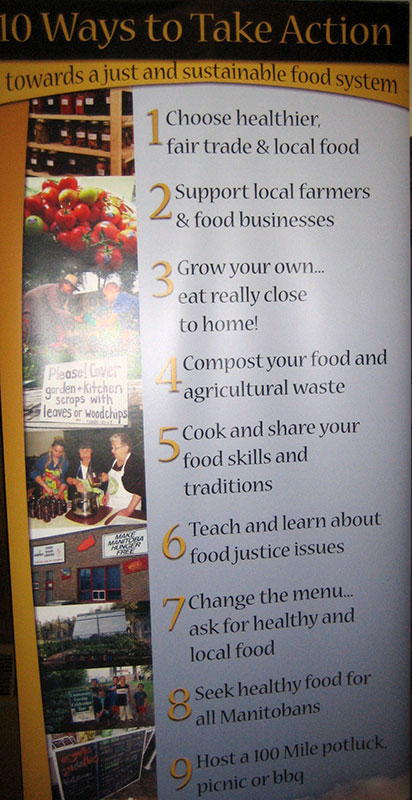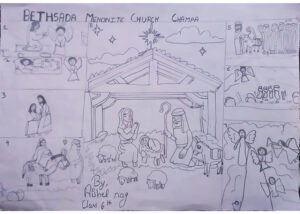The pleasure and fellowship that comes with food and eating seems increasingly flavoured with controversy and confusion.
Controversy surrounding genetically modified organisms (GMOs), pesticide usage and farming practices has left many confused as they face overwhelming choices at their local supermarket. Canada currently faces an obesity epidemic, and food and nutrition classes are facing dramatic cuts in our school system. For many, food is no longer one of life’s pleasures that brings us together at the dinner table, but a worrisome and divisive burden.
With these issues in mind, a three-course roundtable discussion was held at Canadian Mennonite University (CMU) on World Food Day, Oct. 16. In this fifth “germinating conversation” planned by CMU, Mennonite Central Committee Manitoba, A Rocha and Food Matters Manitoba, producers and consumers from a wide variety of backgrounds and viewpoints came together to discuss food issues and choices.
Approximately 100 audience members eavesdropped into the lively conversation of the panel guests who sat around an intimate table in the centre of CMU’s Great Hall. They spoke carefully and reflectively on several topics that had been pre-crafted to help guide discussion:
- How does thinking of food as a gift impact the choice of food we make?
- What issues need to be included for a healthy food system?
- Where do we look for inspiration as we think of our changing food system?
The goal of the evening, as clearly stated by facilitators Kenton Lobe and Jamie Reimer, was not to solve any problems, but rather to enjoy an evening of hospitality and radical dialogue.
“We’re not attempting to solve any problems, but we are aiming to generate conflict,” Reimer said. “Conflict can be good so long as it is not turned into a fight, or ignored. Conflict can be fertile ground for new insights.”
The viewpoints were diverse and at times almost seemed to edge into the controversial, but the conversation was respectful and relevant, at times humorous, and always passionate and honest.
“If food is a gift, then so is the dirt, the sun, the seed,” said panel member Terry Mierau, an opera singer-turned-chicken farmer from Neubergthal, Man. “The seed is a tiny little miracle. It’s in peril to mess around too much with that seed.”
Ron Krahn, a third-generation grain farmer from Rivers, Man., challenged the notion of food as a gift, stating that such a notion might make food easier to discard if it’s just given and not something worked for. “Do we devalue it by calling it a gift?” he asked.
Panel members acknowledged that North Americans often have an unhealthy relationship with food. They presented their idealized versions of a world of healthy eating, but challenged each other with the reality of a growing global population.
“Food became unhealthy when we didn’t know where it came from,” Mierau said, with many nodding in agreement. “We need to know who is teaching our kids, but we also need to know who is feeding our kids.”
Lobe emphasized the appropriate level of diversity that the panel presented. “We were looking for a range in representation,” he said, acknowledging, though, the absence of indigenous peoples, older generations and people struggling with food insecurity. “This was an insider conversation,” he acknowledged.
While pleased with the evening’s conversations, he mentioned the growing need for conversations within the faith community. “We want to create a space for honest, truthful conversation, whether it’s on food issues, homosexuality in church, or sustainable energy,” Lobe said.
The evening was broken up into three courses, beginning with the roundtable discussion, followed by audience table discussions that generated questions for the panel. The event concluded with pumpkin pie—home-baked and store bought, organic and non-organic, with whipped cream or not—once again presenting the audience with a world of choice.








Leave a Reply
You must be logged in to post a comment.